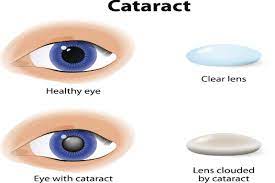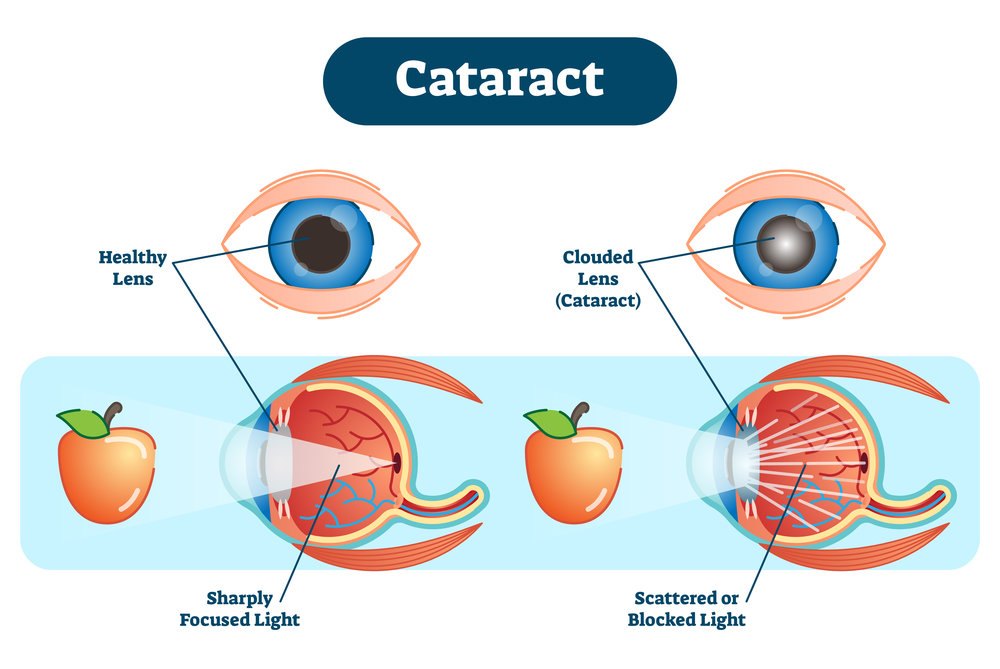One of the leading causes of blindness is cataracts. In fact, it’s estimated that over half a million people are living with cataracts and don’t even know it. If you want to keep your vision healthy for years to come, it’s important to learn about cataract prevention tips. Cataracts are a clouding of the lens of the eye that can lead to blurry vision, and trouble driving at night and reading, and they may also lead to permanent blindness. While this type of eye problem is typically treated by surgery, learn in this article how you can prevent cataracts without having to go under the knife! In this blog post, we will discuss Prevention Tips For cataracts.
Contents
What Is a Cataract?
 A cataract is a condition that affects the lens of your eye. It occurs when proteins in the lens clump together, making it cloudy and impairing vision. As cataracts worsen, they can even cause blindness if left untreated. But luckily, with proper management and lifestyle changes, you can significantly reduce your risk of developing cataracts.
A cataract is a condition that affects the lens of your eye. It occurs when proteins in the lens clump together, making it cloudy and impairing vision. As cataracts worsen, they can even cause blindness if left untreated. But luckily, with proper management and lifestyle changes, you can significantly reduce your risk of developing cataracts.
Cataracts are a natural process of aging, which causes the lens of the eye to cloud over and become opaque. As this continues, it will result in blurred vision that gradually worsens, as well as sensitivity to bright light. Patients may also experience colored halos. Most doctors agree that cataracts are inevitable, but there are interventions that can slow their progress and delay surgery. The centuries-old saying “prevention is better than cure” applies just as much to cataracts as it does to any other disease.
Cataracts are a common condition that affects millions of people. They are caused by a buildup of proteins in the eye, which can cloud the lens and make it difficult to see. Cataracts can be treated with surgery, but there are also ways to prevent them from developing in the first place.
One way to prevent cataracts is to wear sunglasses or contact lenses that block UV light. This will help to reduce the amount of damage that is done to the eye over time. It is also important to eat a healthy diet and to get regular exercise, as these things can help to reduce the risk of developing cataracts.
Who is at Risk for Cataracts?
Cataracts typically develop gradually and are more common in older adults. However, other factors may also increase your risk of cataracts, including:
- Diabetes
- Prolonged exposure to ultraviolet (UV) rays from the sun
- Family history of cataracts
- Previous eye injury or inflammation
- Certain medications, such as steroids
If you have any of these risk factors, it’s important to see an eye doctor regularly so that cataracts can be detected early and treated if necessary. Wearing sunglasses and a hat when outdoors can also help protect your eyes from UV rays and reduce your risk of cataracts.
10 Tips for Preventing Cataracts
Here are tips to prevent cataracts:
Avoid Smoking
Smoking increases your risk of developing cataracts and can lead to other serious health problems, so it’s best to avoid it altogether.
Smoking is a known risk factor for developing both cataracts and AMD, just like UV radiation. It’s because the adverse effects of both are caused by the release of free radicals in the body. Smoking increases the risk of cataract formation and progression almost three times.
Limit Alcohol
Consuming large amounts of alcohol has been linked to an increased risk of developing cataracts, so it’s best to drink in moderation.
Get an Eye Exam Regularly
Having regular comprehensive eye exams is important for detecting cataracts early on and treating them before the vision becomes permanently impaired.
Manage Diabetes
Diabetes can increase your risk of developing cataracts, so it’s important to keep your blood sugar levels under control through diet and exercise.
Increased blood sugar can lead to many different problems, such as cataracts. In fact, the average age at which people with diabetes who have poor sugar control present with cataracts is much lower than the average population. It is thus vital to ensure proper glycemic control. In addition, excess blood sugars also predispose one to a potentially sight-threatening condition called diabetic retinopathy. This occurs when new blood vessels form on the retina, where they then leak fluid and blood, resulting in retinal swelling and hemorrhages.
Wear Contact Lenses Safely
If you wear contact lenses, make sure to follow all instructions for proper use, cleaning, and storage. Improper contact lens care can increase the risk of eye infections which can lead to cataracts.
Exercise Regularly
Regular physical activity can help keep your eyes healthy and reduce the risk of developing cataracts.
Wear a Hat
Wearing a wide-brimmed hat when outdoors can provide extra protection from the sun’s harmful UV rays and help prevent cataracts.
Avoid unnecessary use of steroids
Corticosteroids are known to cause cataracts and should be avoided unless absolutely necessary.
Steroids are potentially life-saving drugs, but their indiscriminate use has led to several problems. In India, even chemists prescribe steroids with little regard for their harmful effects. People also tend to self-medicate. However, they require explicit medical advice and must always be taken under the supervision of a physician. You should also discuss other steroid-sparing drugs with your doctor when possible.
Avoid trauma
Trauma to the eyes, such as a blow or injury, can lead to cataract development. Protect your eyes by wearing protective eyewear when playing sports, using tools or heavy machinery, and avoiding rough play with children.
You can’t predict when trauma will occur, so it must be prevented by wearing protective eyewear like glasses and safety glasses. Eye injuries include cuts and scratches to the eye, punctured eyes, or burns to the retina. They can be caused by things like high-speed winds, explosions, power tools, welding equipment, and guns.
Schedule regular eye exam
Regular eye exams can help in the early detection of cataracts, allowing for timely treatment and better outcomes. During an exam, your ophthalmologist will examine your eyes to check for vision problems or other signs that could suggest an underlying condition.Even if you have no symptoms, your eye health may be declining. After 40, annual visits are necessary because the iris becomes cloudy and changes the way light reaches the retina. This change can be seen at a routine exam and managed better before it affects your vision in any noticeable way.
Other Healthy Tips To Prevent Cataracts
You can prevent cataracts naturally by following methods:
Wear sunglasses when you’re outside
Sunglasses protect your eyes from exposure to ultraviolet (UV) light which may damage the lens of the eye and lead to cataracts. It is important to choose sunglasses that offer 100% UV protection, so make sure they are labeled as such before purchasing them. If you do any kind of hazardous work that puts your eyes at risk, make sure to wear the necessary protective equipment such as safety glasses or goggles.
It is important to shield your eyes from harmful UV radiation. One way to do this is by wearing a wide-brimmed hat, scarf, or dupatta to protect your eyes from the sun’s rays. Protecting your eyes with polarized sunglasses, photochromatic lenses and UV-blocking contact lenses can also help prevent UV damage. Finally, it is important to know that increased exposure to UV radiation has been linked with an increased risk of cataracts and age-related macular degeneration (AMD).
Eat healthily
Eating a healthy diet that includes fruits, vegetables, and whole grains can provide your body with essential vitamins and minerals needed to keep your eyes healthy. Make sure to include foods high in antioxidants, such as blueberries, carrots, and spinach.
Consuming healthy foods such as fruits, vegetables, oily fish and whole grains may result in a decreased risk of cataracts. With antioxidants, vitamins, minerals, and other phytochemicals like vitamins A, C, and E and lutein, zeaxanthin and omega-3 fatty acids also present in many healthy foods, it’s clear that a healthy diet leads to healthier eyes.
Vitamin A
Eating foods high in Vitamin A, such as oranges and carrots, can help prevent cataracts.
Antioxidants
Eating foods rich in antioxidants, such as nuts and berries, can also help slow the progression of cataracts.
Vitamin E
A diet rich in Vitamin E has been linked to a decreased risk of cataracts. Foods high in Vitamin E include almonds, spinach, sunflower seeds, peanut butter, and avocados.
Vitamin C
Increasing your intake of Vitamin C from foods like oranges, broccoli, kale, and kiwi can help protect against cataract formation.
Lutein and zeaxanthin
Recent studies have suggested that these two antioxidants found in many fruits and vegetables can help reduce the risk of cataracts. Eating foods like kale, spinach, corn, squash, oranges, green beans, and egg yolks can help keep your eyes healthy.
What If You Still Get Cataracts?
Although the tips above can help reduce your risk, you may still develop cataracts. In this case, you may need to have surgery to remove and replace the lens of your eye. This procedure is typically safe and effective, with most patients achieving improved vision afterward. Your doctor will discuss potential risks and benefits before deciding if it’s the right course of action for you.
To help delay the formation of cataracts, you can use either wear glasses or undergo surgery. If you have cataracts, your eye doctor will prescribe glasses to help with vision loss in the initial stages. In some cases, spectacles won’t be enough to correct your vision loss and they’ll start interfering with your everyday activities. You should then discuss the risks and benefits of surgery with intraocular lens implantation with your doctor.
Even though the name sounds scary, a LASIK procedure is a very safe and routine procedure that is performed in almost all eye clinics. Your doctor will help you choose either LASIK or PRK (depending on your preferences) and the lens that best suits your specific needs. The surgery should take care of any astigmatism or long-sightedness issues.
It’s also important to remember that cataracts don’t always require surgery. In some cases, simply wearing glasses or contact lenses can help improve vision and reduce associated symptoms. If your doctor does recommend surgery, it is still possible to delay the procedure if necessary as long as your vision isn’t severely impaired.
Conclusion
In conclusion, taking preventive measures can help you avoid cataracts or reduce the severity of the condition. Eating a balanced diet full of antioxidant-rich foods, wearing proper eye protection, and avoiding smoking are all important steps to take to protect your eyes from developing cataracts. If you have any other concerns about cataracts or your eye health, talk to your doctor or eye care provider for more information. Taking these steps can help you maintain healthy eyes and vision for years to come.
If you are concerned about developing cataracts, understanding what causes the condition and how to prevent it is key. By following these 10 tips for preventing cataracts, you can help protect your eyes from this potentially blinding eye disorder and maintain clear vision for years to come.
Cataract surgery is a safe and painless procedure. At MantraCare we have a team of experienced eye surgeons, who will be happy to answer any questions on cataract surgery. Call us at +91-9711116605 for any inquiries.
